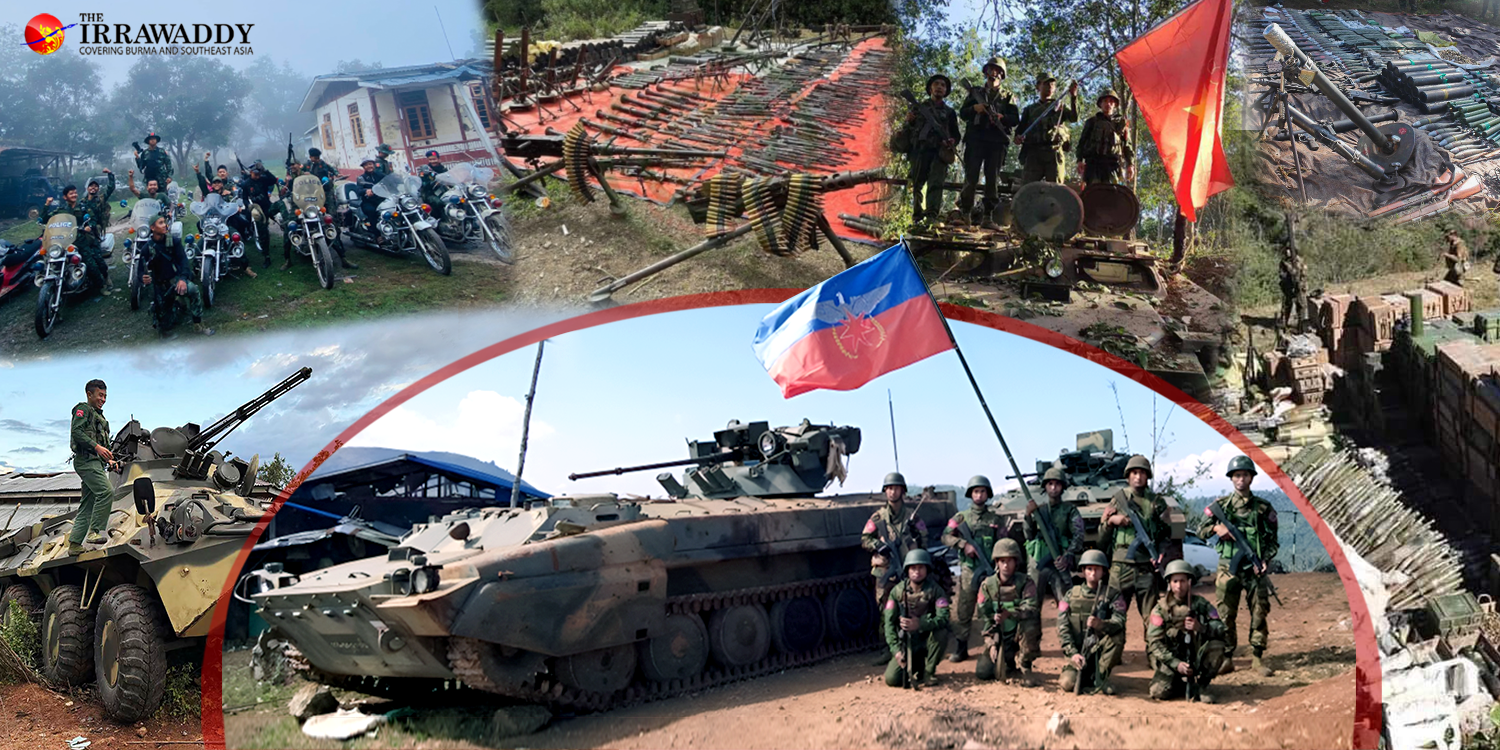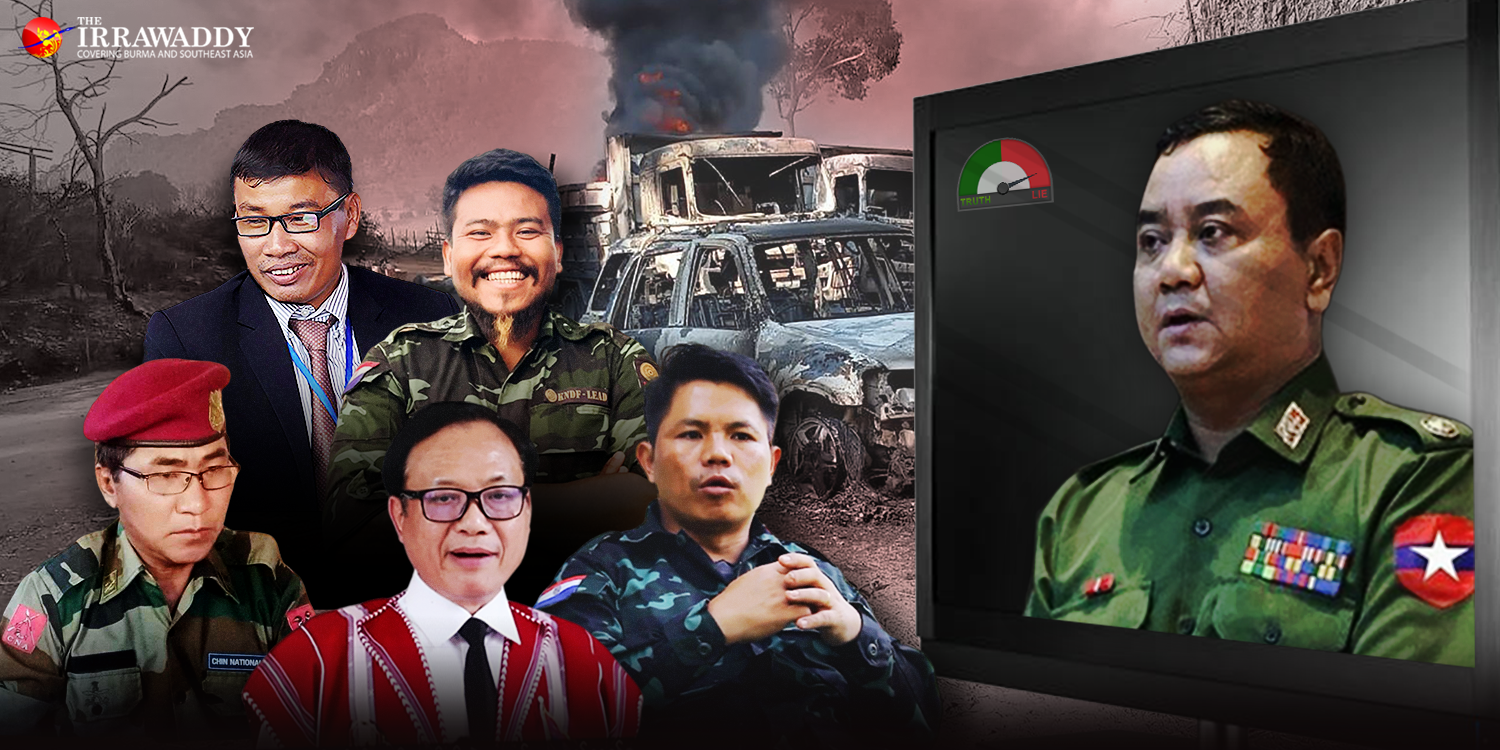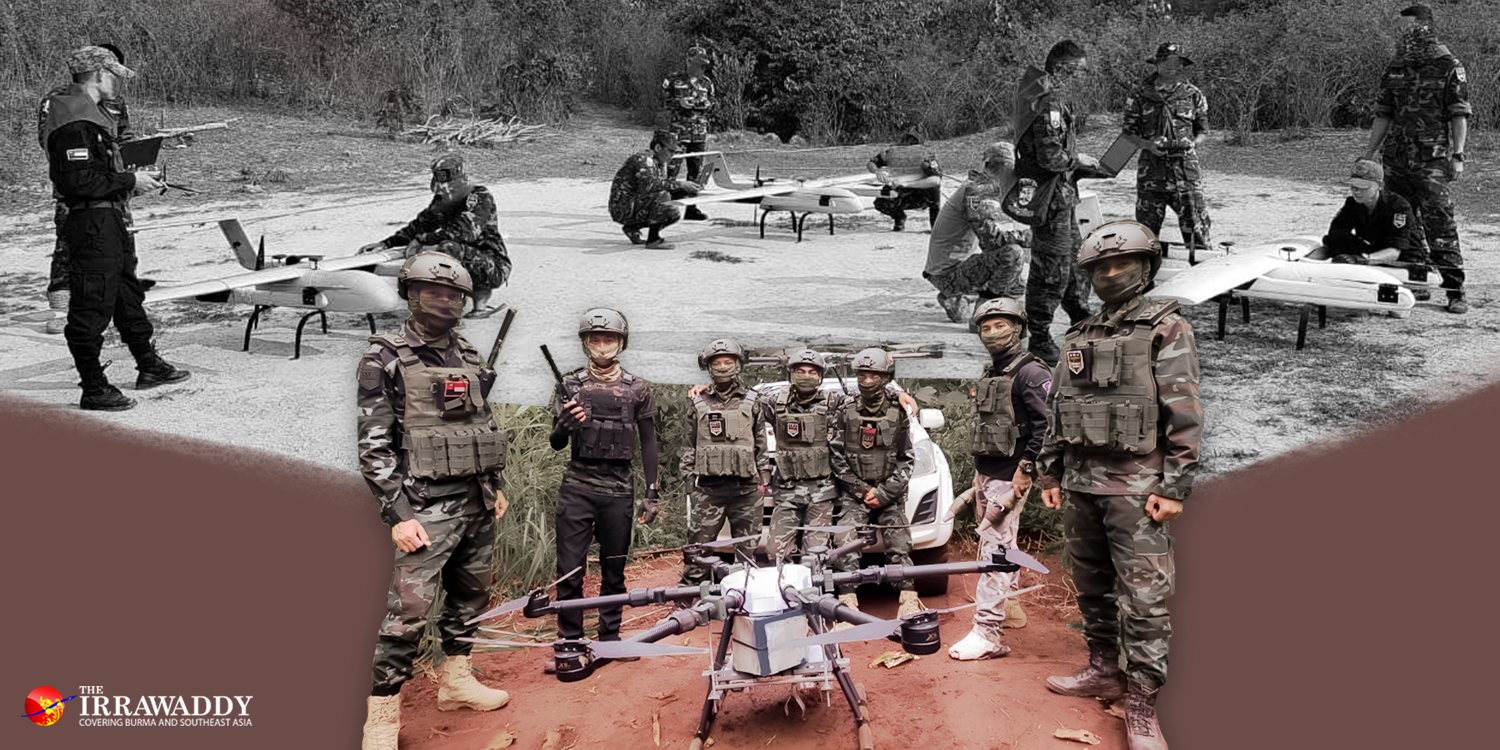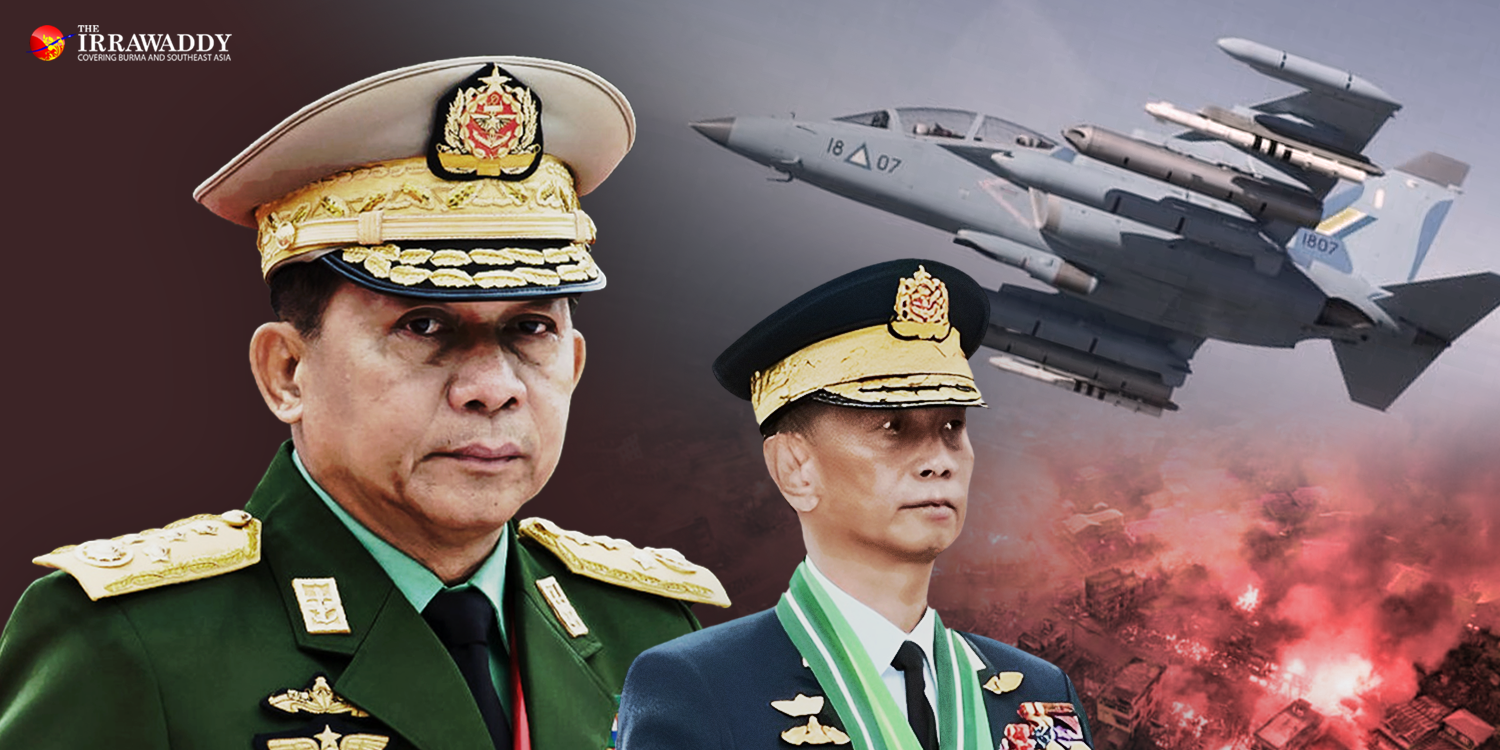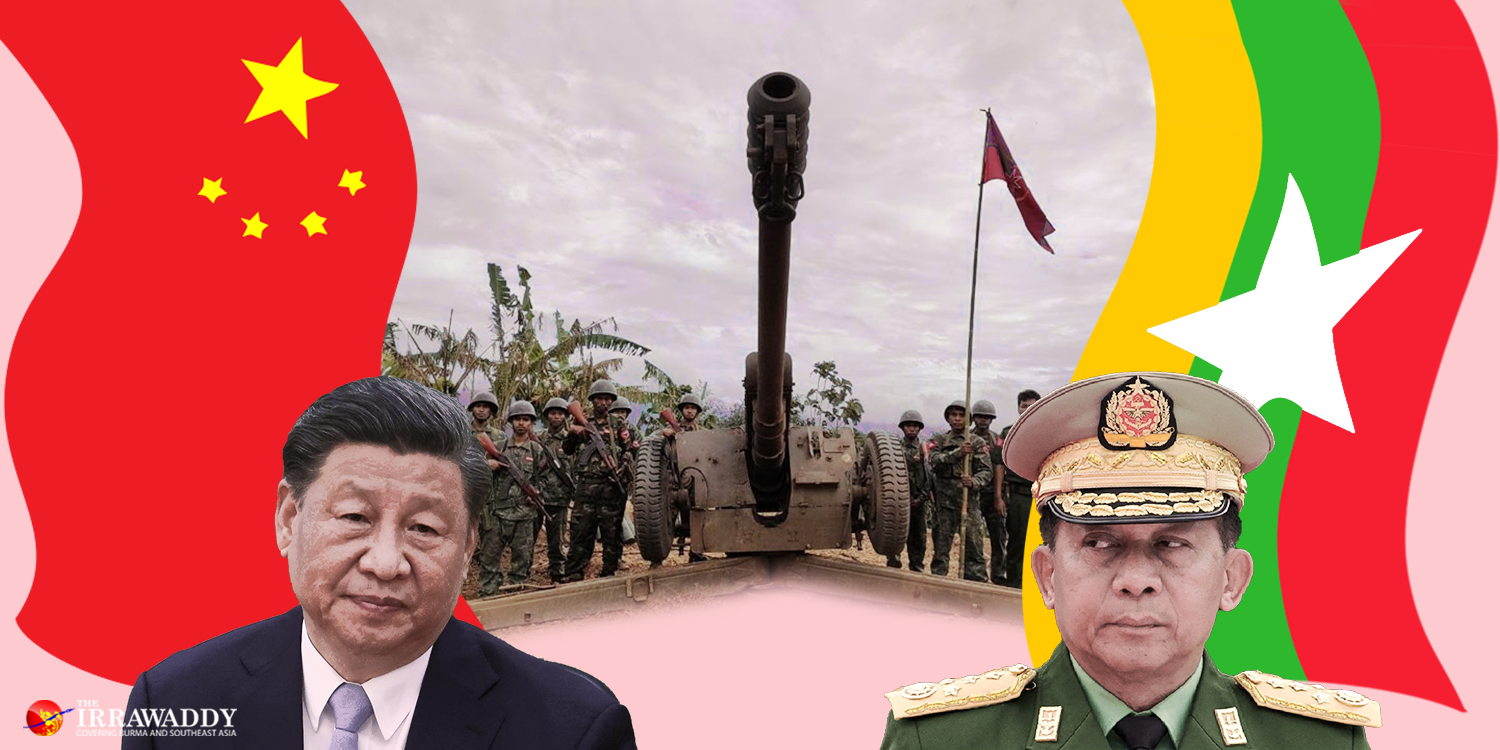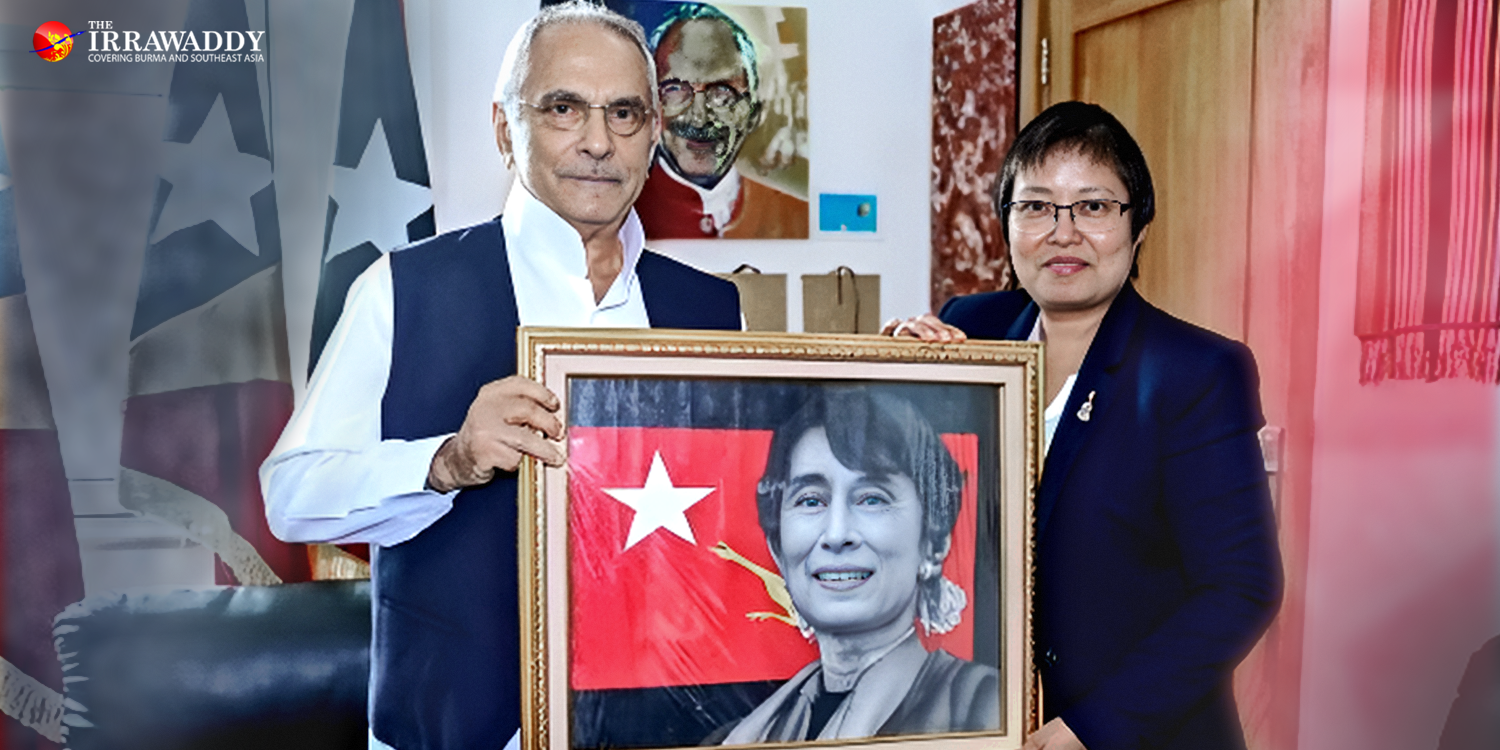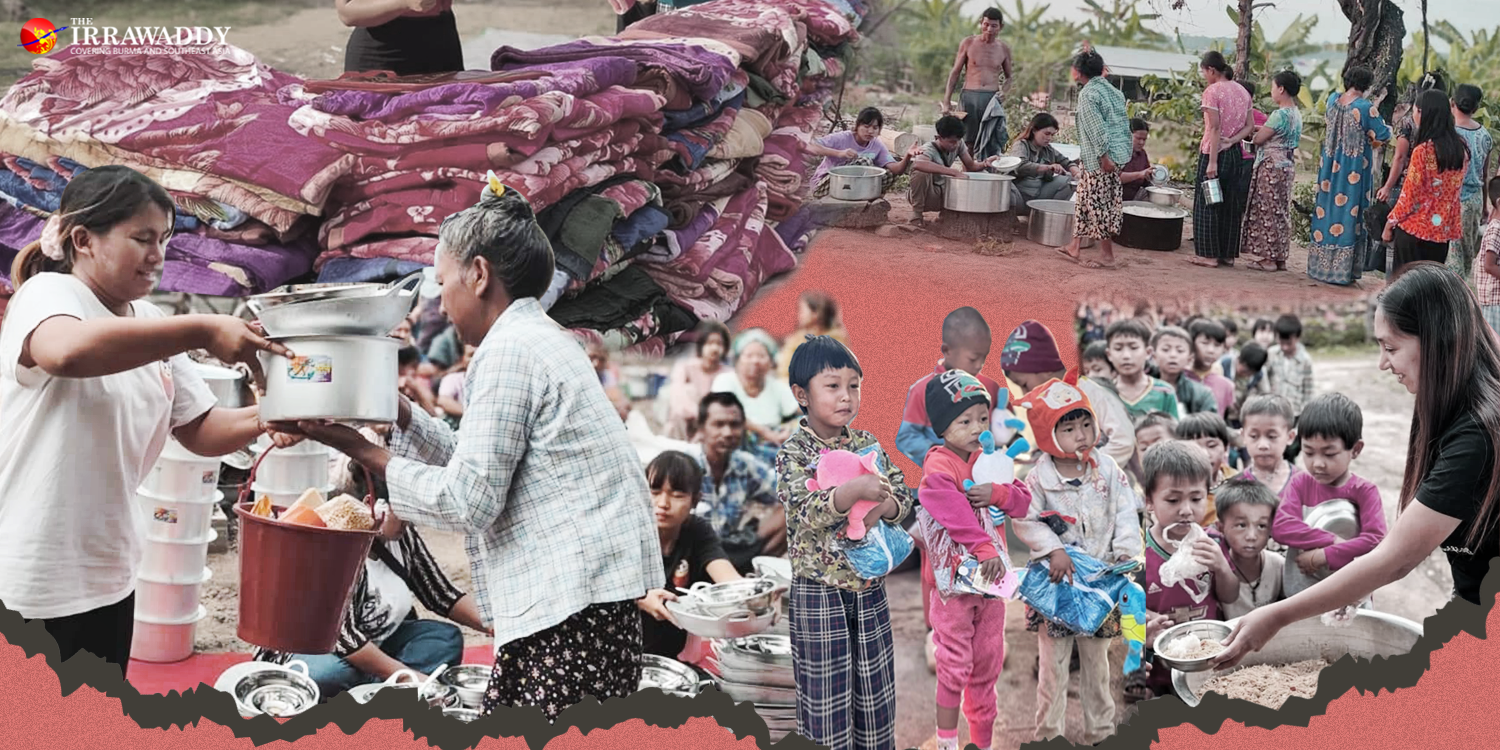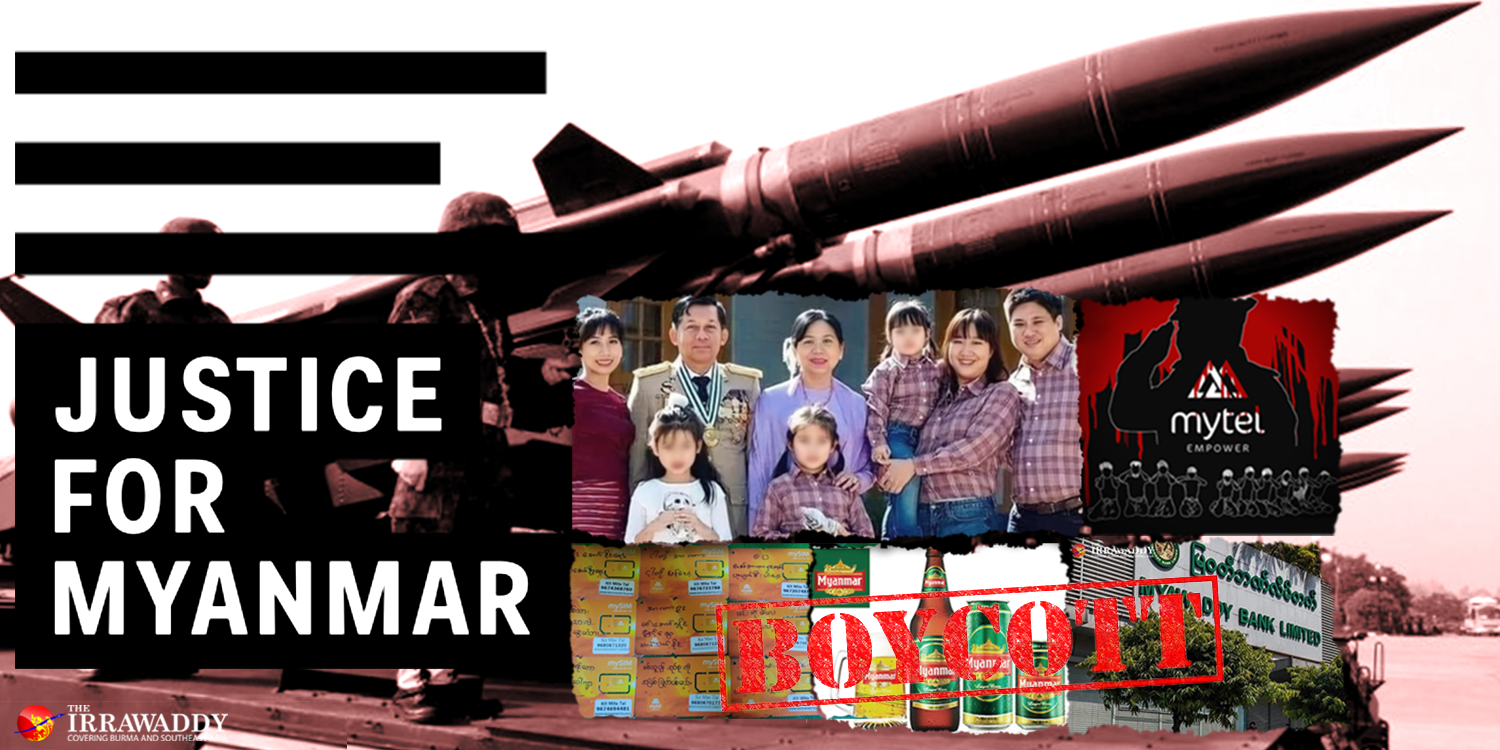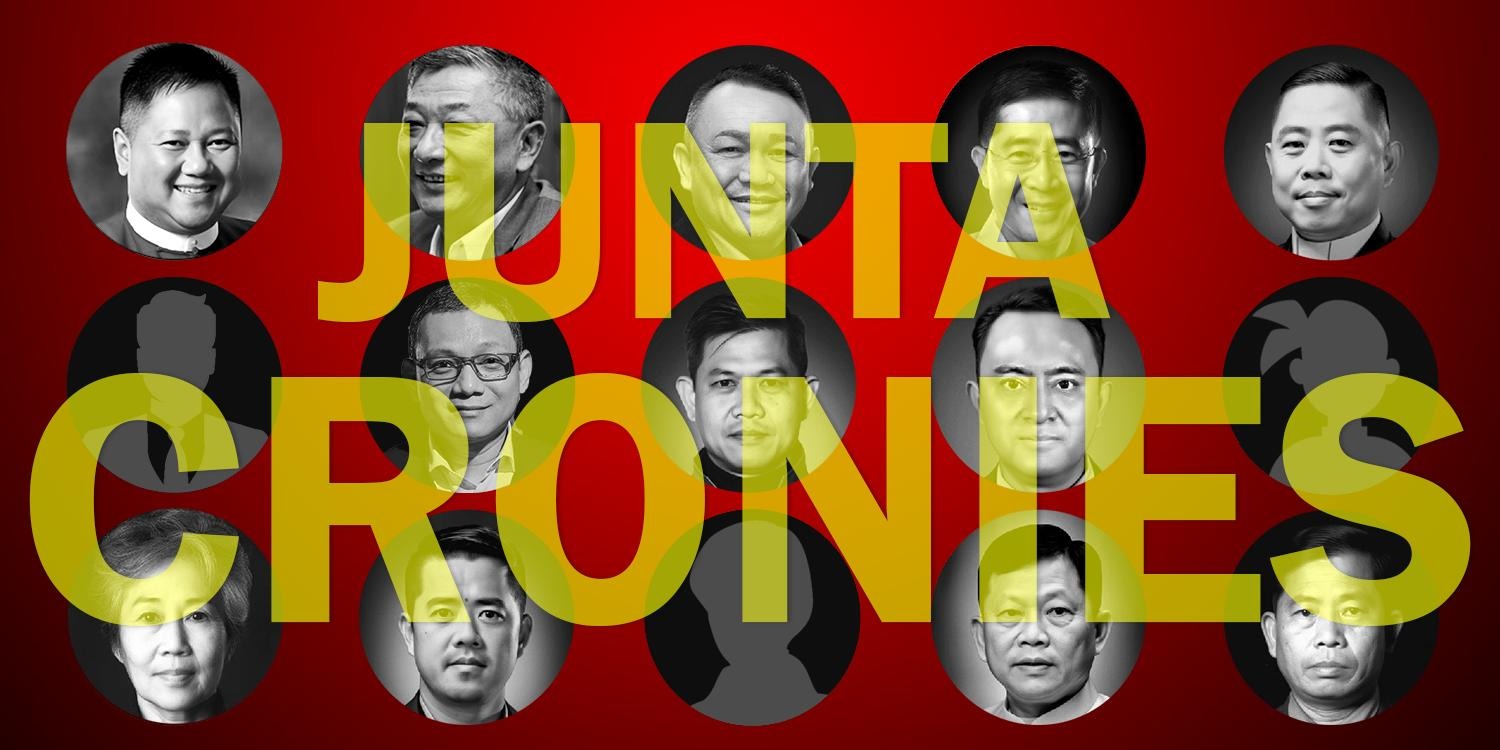2023 proved to be another difficult year for the people of Myanmar, as the military regime of Min Aung Hlaing continued its remorseless bombing and torching of villages across the country, the economy continued to deteriorate, the number of war-displaced soared and the ranks of political prisoners swelled towards 20,000. While some Western nations stepped up sanctions against the regime, the junta’s economic, military and political enablers at home and abroad found ways to keep it supplied. But the year also brought some hope, as the civilian National Unity Government (NUG) and its People’s Defense Forces stepped up their cooperation with key ethnic armies, which inflicted a series of stunning military defeats on the regime’s forces, starting in areas near the Chinese border and soon spreading across the country in all directions. The resistance offensives have seen the military regime lose hundreds of bases and ousted its forces from a number of key towns and trade routes, presenting the junta with the most serious challenge to its rule since it seized power in 2021. As the year draws to a close, the most important foreign player in Myanmar’s crisis—China—appears more than ever to be hedging its bets, and the NUG and a number of high-profile rights groups are finding their voice on the international stage, refusing to let Myanmar’s people suffer in silence.
Below, The Irrawaddy looks at 10 of the key people, groups, countries and forces that shaped events in Myanmar during the year.
The unbowed righteous ones in jail
The righteous ones in jail; the criminals in government. This phrase perfectly sums up Myanmar whenever the country is under a military dictatorship. It has become even truer since the latest coup in 2021. Don’t be startled by this updated number of the country’s political prisoners languishing inside the country’s notorious prisons: As of Dec. 22, there were 19,803 in total including 3,708 women. Even under previous regimes, the figure never exceeded three or four thousand. The Myanmar regime may be the biggest jailer, even among dictatorships, in the world. Elected leaders, young students and members of various professions who have worked or fought for justice, freedom and rights are thrown into jail, while criminals in military uniforms who have committed war crimes, crimes against humanity and genocide take government positions as prime minister and so on. How wrong it is!
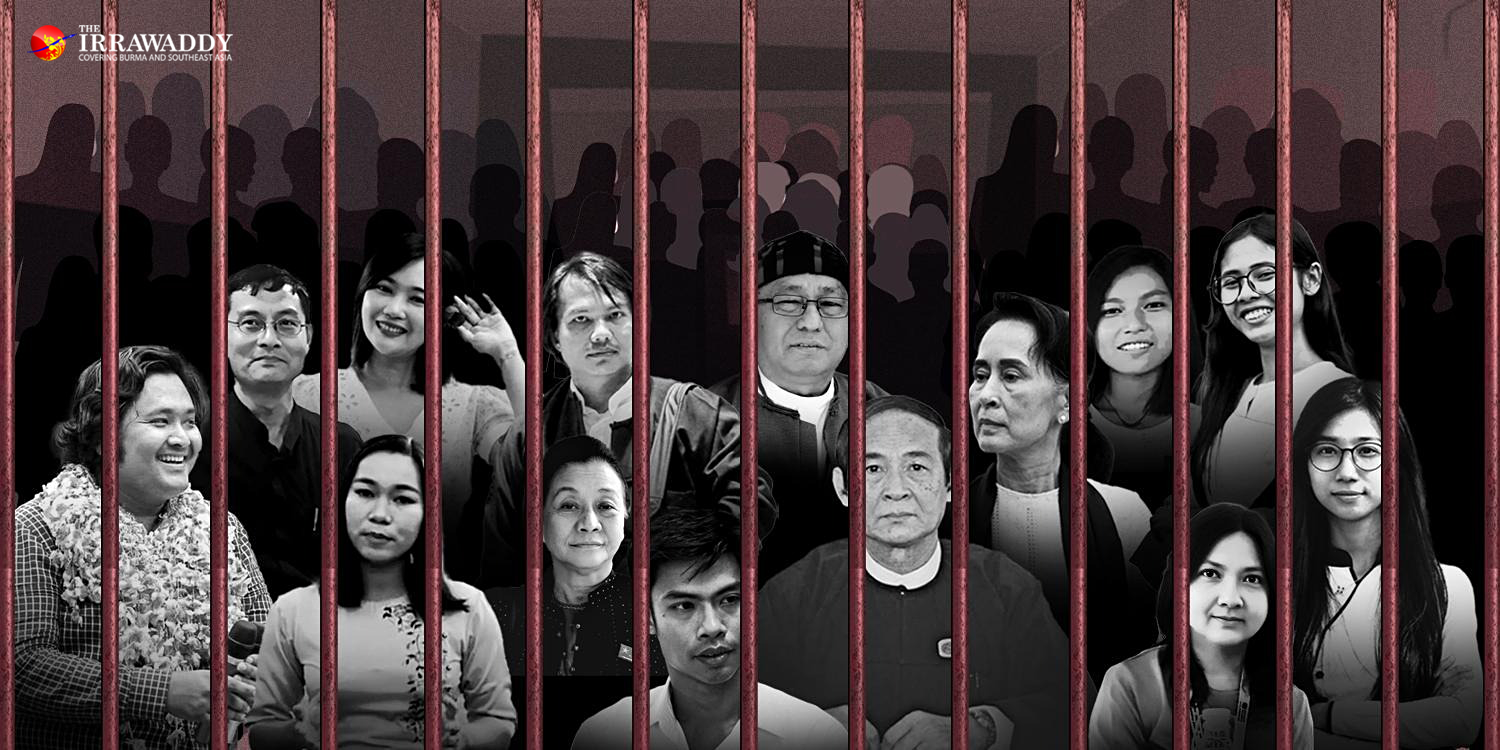
Today, nearly three years after the coup, there is almost no place in the country that has not been scarred by the war between the criminal junta and Myanmar’s defiant people—from battlefields where armed resistance forces wage military offensives against junta troops, to the streets of Yangon and other cities where anti-regime protesters stage guerilla-style protests. However, of all the front lines, perhaps the ones where the fighters are the most vulnerable are in the junta’s jails, because there we find the country’s most defenseless fighters—the political prisoners.
We know from horrific experience how vulnerable and defenseless they are behind bars. Last year, prominent democracy activists Ko Jimmy (aka Kyaw Min Yu), Ko Phyo Zeya Thaw and two other activists were pulled out of their cells and hanged, their families given no prior notification. Moreover, as of Dec. 18, at least 69 political prisoners have died due to harsh conditions, insufficient medical assistance and torture since the coup, according to the Assistance Association for Political Prisoners – Burma. Unlike their comrades at large or on the battlefields, the political prisoners have no weapons except their inner strength, courage, determination and political conviction. Nothing else.
But while their numbers have fluctuated, they have always been a force, haunting rulers and undermining their illegitimate systems. That’s why they are kept in jails—and are, perhaps, the force the brutal generals fear most. They include elected leaders; young student protesters; CDM (Civil Disobedience Movement) workers such as physicians and teachers; journalists and members of other targeted professions. Among them are U Thaung Win, who was arrested last year and sentenced to five years’ imprisonment for being the former publisher of The Irrawaddy. Of the nearly 20,000 political prisoners, among the oldest are the country’s 78-year-old elected leader State Counselor Daw Aung San Suu Kyi and 72-year-old President U Win Myint. The youngest prisoners are young enough to be their grandchildren. They may be teenagers, but they are among the country’s bravest freedom fighters.
As long as Myanmar remains under this military regime, this bitter situation won’t change: The righteous ones in jail; the criminals in government.
By Kyaw Zwa Moe
———————————-
Resistance Armies: Inflicting stunning military defeats on the junta
Successful offensives by an ethnic alliance comprising the Arakan Army (AA), the Myanmar National Democratic Alliance Army (MNDAA) and the Ta’ang National Liberation Army (TNLA) and allied resistance groups in northern Shan State, and a similar one in Karenni (Kayah) State led by the Karenni Nationalities Defense Force (KNDF) and its allies, saw Myanmar’s popular armed revolt against the regime make a dramatic breakthrough in the closing months of the year.
The armed revolt saw a sharp escalation in northern Shan State in late October when the alliance launched a series of coordinated and highly successful attacks against regime troops, under the name Operation 1027.
The offensive spread like wildfire from northern Shan, reaching as far as areas surrounding the Myanmar military’s garrison town of Pyin Oo Lwin in Mandalay Region. Dozens of junta camps and tactical bases, as well as gates on the Chinese border, fell to the resistance within a few weeks, inflicting significant losses on the military and leaving the junta facing the gravest threat to its existence since its 2021 coup.
The operation has won widespread popular support for its declared aim of rooting out the military dictatorship and helping to bring about a federal democratic union with authentically self-administrative regions.
Following in the footsteps of Operation 1027, several dozen resistance organizations including People’s Defense Force groups (PDFs) under the command of the civilian National Unity Government (NUG) and other ethnic armed organizations (EAOs) have escalated coordinated attacks on regime targets in Mandalay, Sagaing and Magwe regions, Rakhine and Chin states, and elsewhere.
In Karenni State, local anti-regime resistance groups the KNDF, the Karenni Army (KA), the Karenni National People’s Liberation Front (KNPLF) and several PDF groups have jointly launched Operation 11.11 aiming to seize the state capital Loikaw as well as townships in neighboring southern Shan State. So far, they have managed to seize over half of the Karenni capital.
Hailed as the biggest and most coordinated offensives against the Myanmar military in decades, the two operations and other campaigns inspired by them have so far seized over 400 military bases and over 20 towns. Stung by the severity of its losses, the Myanmar junta has resorted to heavy aerial bombardments and artillery shelling but has still failed to retake any of the bases and towns it lost.
As the operations have progressed, the military’s desperation and inability to mount an organized defense against the coordinated attacks have become clear. So far, over 600 junta soldiers have surrendered to resistance groups, and hundreds more have simply fled, abandoning their bases.
Witnessing the resistance’s unprecedented successes and the regime’s weakness, some international observers believe Myanmar has reached a tipping point in terms of overthrowing the military dictatorship, with Operation 1027 and the campaigns launched in its wake posing a genuine challenge to the junta’s existence.
By Nayt Thit
———————————-
Spokespersons: Building trust in the revolution… and lying for the regime
As resistance offensives against the Myanmar military regime multiply in the wake of Operation 1027, spokespersons for some of the country’s ethnic armed organizations (EAOs) have become well-known names, keeping the public informed about the fighting through various media channels.
Their opposite number is junta spokesman Major General Zaw Min Tun, who is notorious for his blatant attempts to deceive the Myanmar people with fake news and disinformation. Operation 1027, an offensive launched against the regime on Oct. 27 in northern Shan State, has turned a spotlight on the Myanmar National Democratic Alliance Army (MNDAA), an ethnic Kokang armed group and one of the three members of the Brotherhood Alliance.
Its spokesman Li Jiawen has captured the public’s attention with his accounts—delivered in a Kokang accent—of the Brotherhood Alliance’s defeats of junta troops, as well as his updates on how many towns and outposts it has seized from the regime, and how many junta soldiers have surrendered. Eagerly anticipated by the majority of Myanmar people, Li’s descriptions of the defeats inflicted on the junta have met with an enthusiastic reception.
Operation 1027 has seen the ethnic alliance seize control of seven towns, including frontier towns crucial for border trade with China. The fall of hundreds of junta positions in northern Shan State in less than a month has set an inspiring example for armed revolts elsewhere in Myanmar.
Karenni Nationalities Defense Force (KNDF) chairman Khun Bedu has become the face of the resistance movement in Karenni (Kayah) State.
Karenni revolutionary organizations have won applause from the public for their humane treatment of prisoners of war. They say they will punish prisoners of war, including Khaing Thant Moe, the first junta pilot to be captured alive, in line with the law and according to the severity of their crimes against the civilian population.
KNDF deputy commander Marwi looks a tough man with a muscular physique and bearded face. He became famous when video emerged of him coaxing junta soldiers to surrender during a clash in Karenni State’s capital Loikaw. He is also popular on social media for his articulate messages about the revolution, such as “We are fighting for the people and democracy”—not to mention his tattoos tallying the number of his comrades killed in action.
In Chin State, Chin National Front spokesman Salai Htet Ni is doing his job by reporting on how Chin revolutionary groups are fighting the regime and restoring the civilian administration there.
Another well-known figure is Padoh Saw Taw Nee, the spokesman of Myanmar’s oldest ethnic armed organization, the Karen National Union (KNU). He frequently reports on fighting in the KNU-controlled territories and has warned revolutionary groups not to succumb to the regime’s efforts to drive a wedge between them.
Arakan Army spokesman Khaing Thukha also briefs the media on the military situation in Rakhine State and neighboring Paletwa Township in Chin State, while keeping them updated on the junta’s grave human rights violations including arbitrary arrests and unprovoked air and artillery strikes.
Meanwhile, never one to let the facts get in his way, junta spokesman Zaw Min Tun soldiers on, spouting his flagrant lies, presumably believing they will somehow distract the public from the regime’s mounting losses.
When the strategic town of Kunlong in northern Shan State fell to the resistance, Zaw Min Tun described the regime forces’ ousting as a “temporary tactical withdrawal”. On another occasion when junta troops fled their bases fearing for their lives, he described it as a “regrouping of troops for tactical purposes”. Even when entire junta battalions surrender en masse, Zaw Min Tun insists no soldiers would participate in a such a “cowardly” act.
So, while the spokesmen from revolutionary organizations demonstrate their commitment to the public’s right to information, their respect for rules of engagement and human rights, and their humanity, junta spokesman Zaw Min Tun keeps on telling barefaced lies for the regime he serves.
By Maung Kavi
———————————-
Drones: Nowhere to hide for junta forces
In the nearly three-year-old nationwide armed revolution against the military regime, drones have become the most powerful, destructive weapons available to Myanmar’s main resistance groups—the People’s Defense Forces (PDFs) and their allied ethnic armed organizations (EAOs)—intimidating and having a major psychological impact on junta troops, including regime leaders.
Even the resistance forces’ improvised, remotely operated fixed-wing aircraft—which are small and relatively inexpensive, costing around US$1,000 to $2,000 to produce—are now challenging and threatening junta ground forces despite the latter’s superior firepower, including artillery.
Late this year, amid the deployment of anti-drone jammers by regime forces, two small, makeshift fixed-wing airplanes launched by resistance groups successfully circled over and dropped bombs on aircraft hangers at two junta airbases—one in Taungoo Township, Bago Region and the other, significantly, in Naypyitaw, the junta’s administrative capital.
The drone strikes prompted regime leaders to seek regional help on anti-drone measures.
In late 2021, when the armed revolt against the regime was still largely confined to using homemade firearms, makeshift explosive devices and a few automatic weapons, resistance groups in Sagaing Region were the first to start converting commercial drones for combat use, suspending improvised bombs from them and dropping the explosives on regime targets.
Later, with donations from Myanmar people at home and abroad, anti-regime resistance groups widely and successfully used agricultural drones, which can carry several 60- to 80-mm mortar bombs, for their aerial operations against junta outposts, military headquarters and junta-run government offices.
Furthermore, PDFs across the country have managed to devise makeshift fixed-wing drones, which, while cheaper to produce, contain sophisticated equipment for use in long-range missions for the purposes of surveillance as well as combat.
This year, to support an escalation of raids on regime targets, bases and headquarters by resistance ground forces, anti-regime groups increased their aerial operations, launching relentless drone strikes on junta targets and bases nationwide.
In some cases, resistance groups have used improvised fixed-wing drones in Kamikaze operations to bomb military bases and headquarters.
Military personnel and defecting soldiers have admitted to being terrified of resistance drones.
In the ongoing, highly successful resistance offensive Operation 1027, which has seized around 300 junta positions including tactical bases and military command headquarters in a short period of time across northern Shan State, a large number of agricultural drones have been used to rain hundreds of destructive bombs on military bases before they are raided by resistance ground forces.
The operation prompted the military regime to hold an urgent National Defense and Security Council meeting, at which junta boss Min Aung Hlaing admitted drones played a major role in the capture of junta bases in northern Shan.
So fearful has the military regime become in the wake of the nationwide resistance drone attacks, it recently prohibited all shops including stores in shopping malls from selling drones, including toy drones for children.
By Nayt Thit
———————————-
Min Aung Hlaing: Blood-soaked and beyond redemption
With his brutal rule over Myanmar’s people now nearly three years old, the amount of blood on Min Aung Hlaing’s hands only grew over the past year as he continued to engage in the most serious of crimes against his own people: genocide, war crimes and crime against humanity.
Like a wild beast, he got his first taste of blood in the lethal crackdowns he ordered on peaceful anti-coup protesters in early 2021. Since then, he has unleashed ever more frequent and deadly attacks on anyone who opposes his rule. The results have been tragic, given that those who reject his rule account for a majority of the country’s nearly 56 million people.
In shedding blood and killing people, the 67-year-old spares no means. He orders his ground troops to spray residential neighborhoods with bullets while hunting for protesters, and committing massacres is perfectly acceptable. He turns a blind eye to his subordinates’ arbitrary killings of political prisoners during interrogations. He permits his soldiers to shell villages if they are suspected of sheltering resistance forces. He lets his air force chief Htun Aung bomb any target as long as the mission is to eliminate “terrorists”—his regime’s euphemism for anyone who fights against his rule. It doesn’t matter if the target is a school or a hospital or a shelter for internally displaced people.
He has horrified the world with his troops’ merciless killings of civilians. As of August this year, his air force had carried out 902 air strikes across Myanmar, killing at least 687 civilians, including children, and the attacks are still going on. The deadliest came in April when a military jet fighter dropped two bombs on a house in Sagaing Region’s Pazi Gyi Village where a housewarming ceremony was being held. The attack killed more than 170 civilians including 42 children. Nor does he seem bothered by his soldiers’ slaughtering of more than 500 people in 22 massacres across the country since the coup. Of course, there may be more cases that have yet to be documented. When UN investigators and Myanmar’s parallel National Unity Government accuse him of war crimes, genocide and crimes against humanity for his forces’ murderous rampages, no one is surprised.
You may wonder if Min Aung Hlaing has accomplished anything else apart from the crimes he has committed during his three-year rule. Yes—he has racked up an impressive list of failures!
Since his takeover in 2021, he hasn’t been able to fully bring the country under his control amid an armed uprising. The situation for his military is getting dire with mounting defeats in the face of ongoing offensives by ethnic armed groups and their allied resistance forces in most parts of the country. Internationally, he is still an outcast, his regime buried in seemingly endless sanctions. The country’s economy is in a downward spiral and its foreign reserves are being depleted due to his mismanagement.
In other words, he is now cornered, retreating on every front. Such are the crimes he has committed, he will never be able to atone for his sins; there is simply too much blood on his hands for it to be washed away. He will surely be made to pay for it.
By Hpone Myat
———————————-
China: From staunch ally to thorn in the regime’s side
If 2023 has been the most turbulent year for the Myanmar junta since the 2021 coup, they surely blame their friends to the north—China.
Internationally, Beijing has been seen as one of the regime’s two staunchest supporters, along with Moscow. It has never condemned the military takeover that toppled the country’s democratically elected government and led the Southeast Asian nation to become a war-ravaged, failed state. Instead, looking to protect its US$35 billion worth of investments in the country, China sells arms to the junta, vetoes resolutions against it at the UN and engages with it, despite the fact that it has killed at least 4,200 people for opposing military rule.
The relationship soured somewhat, however, in late 2023 when an alliance of three ethnic armed groups, over whom China is believed to have influence, launched a series of coordinated offensives known as Operation 1027 against the regime in northern Shan State. In less than two months, the fighting spread across most parts of the country and the junta has humiliatingly lost around 300 junta bases (including tactical ones), nine towns and vital trade routes with China.
Some observers claim such unprecedented victories would be impossible without China’s encouragement. They say China switched sides for its own interests after the regime failed to crack down on online scam operations in the Kokang region near the Chinese border, as the junta is believed to have been paid off by the scammers. Worse, the syndicates use trafficked Chinese nationals as forced labor, making the issue a Chinese foreign-policy priority. Furthermore, much to Beijing’s delight, one of the stated aims of the alliance’s offensive, along with defeating the military dictatorship, is to eliminate the scam syndicates.
Despite its anger at China, the junta hasn’t dared to officially denounce Beijing, apart from sponsoring some anti-China protests demanding Beijing stop supporting the alliance. Instead, it has pleaded with China to broker a ceasefire with the three ethnic armed groups, assuming they are just straightforward proxies of China. To please the junta, China arranged talks but no tangible results followed; there has been more fighting, leading to more junta bases being seized. At nearly the same time it was organizing the talks, China issued arrest warrants for 10 scam syndicate leaders in Kokang to put more pressure on the regime. The warrants include one for junta boss Min Aung Hlaing’s close ally Bai Suocheng, a defector from ethnic alliance member the Myanmar National Democratic Alliance Army (MNDAA). He partnered with Min Aung Hlaing in 2009 to depose the MNDAA and establish Myanmar army control over the Kokang region.
Previously, the junta also issued warrants for those wanted by China. But this time the regime has been silent as it cannot control Kokang without people like Bai, who lead the regime-allied local Border Guard Force (BGF). Worse, handing them over to China means surrendering Kokang to the MNDAA and its allies.
The situation will surely be costing Min Aung Hlaing some sleep in Naypyitaw as he struggles with mounting troop losses elsewhere. Being put in a tight corner by his ally China is the last thing he needed. But it has happened. The regime may now be trying hard to figure out the best offer it can make to keep China on its side, as it knows China always puts its own interests first.
By Hpone Myat
———————————-
East Timor: Lonely voice of support for Myanmar people
Of the 11 Southeast Asian countries, East Timor (Timor-Leste) deserves to be singled out for praise for daring to openly support Myanmar’s anti-regime movement and publicly shame the military junta, much to the latter’s annoyance.
At half the size of the US state of Maryland and with just 1.35 million people, the former Portuguese colony, later occupied by Indonesia for a quarter of a century, is the smallest state in the region and not economically strong. But, like no other in the region, its government has had the guts to vocally protest against the junta for its brutality against its own people and to openly engage with Myanmar’s parallel National Unity Government (NUG). The NUG commands the loyalty of the vast majority of Myanmar people for its leading role in the country’s ongoing popular war against the regime. Unsurprisingly, the island nation in the Malay Archipelago has become a thorn in the junta’s side.
While other regional countries have been struggling to decide whether to engage, even unofficially, with the parallel government lest they attract the junta’s fury, in July this year Dili officially invited the NUG to the swearing-in of the new East Timor government. The invitation made East Timor the first country to invite the NUG to a national-level event as the legitimate government of Myanmar.
Angered by the move, the junta expelled the chargé d’affaires at East Timor’s embassy in Yangon, saying the country was “encouraging the terrorist group to further committing their violations in Myanmar”. The junta has denounced the NUG as a terrorist organization.
The junta’s diplomatic hardball failed to silence East Timor President José Ramos-Horta, who asked world leaders at last year’s United Nations General Assembly why they were not helping Myanmar the way they are helping Ukraine.
But the 74-year-old recently went further—and sparked fury in Naypyitaw—by calling for junta soldiers to defect and stand by the Myanmar people amid expanding resistance offensives across the country.
Coming amid a series of anti-regime offensives that have seen large numbers of regime soldiers surrender to ethnic and resistance armed groups, Ramos-Horta’s call prompted the junta to publish remarks and editorials that not only slammed the leadership of East Timor, but also described it as a “small, backward country” with no history. The junta also organized public rallies against Ramos-Horta.
Yes, East Timor may be small, but it has stood tall and shown that it’s strong enough to annoy the junta by openly speaking out on behalf of the people of Myanmar while others in the region hold their tongues.
By Maung Kavi
———————————-
Civil Support Volunteers: A lifeline for millions displaced by war
Whenever fighting between regime troops and resistance forces increases in Myanmar, so does the number of internally displaced persons (IDPs). It is estimated that at least 2.6 million people have been forced from their homes since the 2021 coup. As the majority cannot access support from international aid agencies, local support groups have become a lifeline for them.
Commonly known as civil support groups, they are run by local volunteers and rely heavily on donations from Myanmar well-wishers at home and abroad. They can be found in many parts of the country, especially in resistance strongholds like Sagaing Region and Kachin and Karenni (Kayah) states, and in other places where large numbers of people have had to flee the junta’s frequent air strikes, as well as its ground troops’ continual raids and arson attacks. The groups provide IDPs with food, shelter and medicines. As they are locally run and rely on donors, they are unable to cover all of the displaced people’s needs. Nonetheless, they continue their work with whatever they have. For Myanmar’s IDPs, a handful of volunteers with limited resources is better than nothing.
In Sagaing, one of Myanmar’s hardest-hit regions, the civil support group Anyar Pyitinehatung has been feeding 1,000 refugees daily in Salingyi, Yinmabin, Kani and Pale townships for six months, while providing basic necessities like blankets and kitchen utensils to those who can return to their homes. With the support of Myanmar well-wishers—both locals and those based overseas—Depayin Refugee Support Group is helping people who have lost their homes to the regime’s arson attacks. Among other assistance it has provided cash support to 5,000 households with the help of some international non-governmental organizations.
In war-torn Karenni State, the group Clean Yangon has been on a different mission since 2021. Originally from Yangon, where it was formed to make the former capital clean and green, the philanthropic organization is now operating in Karenni, where it not only provides three meals a day to people fleeing regime troops, but also builds shelters for them. It also assists them with healthcare while building schools for children.
Similarly, in war-ravaged northern Shan State, local volunteer groups are busy helping people fleeing fighting from as far away as the Chinese border.
Despite their best efforts, Myanmar’s volunteers are finding it increasingly difficult to cope, as more than 660,000 people were displaced from October to November in six states and five regions after fighting spread to many areas following the launch by ethnic armed groups and allied resistance forces of a major offensive in northern Shan State. As the fighting rages on, the number of IDPs will surely rise and the aid groups will struggle to keep their mission alive. In Myanmar, those who have been forced from their homes continue to suffer the most as a result of the fighting.
By Yuzana
———————————-
Justice for Myanmar: Exposing the junta’s enablers
Justice for Myanmar (JFM) has become a powerful voice shedding light on the military’s murky business ties both locally and internationally, and exposing the military leadership’s corruption and other abuses of power.
Since it was founded by a group of covert human rights activists from Myanmar in April 2020, JFM has worked tirelessly to expose the activities of the military cartel with the aims of dismantling it and achieving justice and public accountability.
The group’s mission became even more urgent after the military coup in February 2021. JFM has worked to support the anti-regime revolution by tracing the sources of the military’s funds, and the arms, equipment and jet fuel it uses in its brutal killings of Myanmar people. With this information it pressures international governments, companies and investors to cut ties, and disrupts the military’s attempts to gain international legitimacy.
JFM has exposed hundreds of the Myanmar military’s murky businesses and financial resources at home and abroad, as well as the business networks of military leaders, their families and cronies—all of which enable the military’s international crimes including war crimes and crimes against humanity.
The group’s deeply researched investigations and reports have aided public boycotts of military-linked businesses, and led foreign companies and multinational corporations working with the military to divest hundreds of millions of dollars from such businesses and to suspend or even withdraw investments since the coup. Among them are oil majors Total Energies of France, Chevron of the US and Woodside of Australia, as well as Japanese beer giant Kirin Holdings, Indian port services company Adani, a Singaporean shareholder in the Myanmar military’s tobacco firm, and South Korea’s POSCO C&C.
JFM has also gone after the military’s sources of arms, equipment and jet fuel, publishing a list of more than a hundred local and international arms brokers and jet fuel suppliers that keep the military supplied and are complicit in its atrocities.
The team has also spotlighted the failures of the international community, including regional bloc the Association of Southeast Asian Nations (ASEAN), to act to stop the military’s international crimes and end the total impunity that emboldens the junta to wage its campaign of terror against the people.
JFM also collaborates with journalists and civil society actors in fighting for justice and the safety of all people in Myanmar and to hold the military to account.
As a result of JFM and its allies’ outstanding work, international governments have been forced to pay closer attention to what is happening in Myanmar. Their targeted sanctions imposed on conglomerates and businesses run by the military, junta members and institutions, as well as some key arms brokers and jet fuel suppliers, are beginning to disrupt the cartel’s global network.
“In the coming year, we will continue to target the terrorist junta’s main sources of funds, arms and jet fuel, including in relation to the exploitation and trade of natural resources. We will also continue to use strategic litigation against the junta to try to hold people and companies complicit in the junta’s crimes to account and to deter others from seeking profits from the junta’s slaughter of Myanmar people,” JFM spokesperson Yadanar Maung told The Irrawaddy.
In a report marking its third anniversary, JFM stated, “Fighting this cartel isn’t easy, but we can do it together.”
“Whoever and wherever you are, you can join the fight.”
By Khin Nadi
———————————-
Junta Cronies: Fueling the regime’s war crimes
Facing nationwide resistance and international condemnation of its atrocities, the Myanmar military junta has relied heavily on the support of cronies to hold onto power, and these business associates have remained loyal to the generals. These partners in crime—both new faces and long-established cronies—aid and abet the military junta’s relentless atrocities against the people of Myanmar, in which hundreds of children have been killed and tens of thousands of houses torched. They help finance the murderous junta, keeping it supplied with arms, equipment, jet fuel, dual-use goods and other technologies, while enabling it to continue to commit atrocities and war crimes, and to evade sanctions by creating new entities.
Among them, some of the largest contributors and key arms brokers have been hit with sanctions from the UK, US, EU and Canada. A few of the well-known suppliers of the junta targeted by sanctions are Star Sapphire Group of Companies and its founder Tun Min Latt, who has deep ties with the family of junta chief Min Aung Hlaing; Aung Hlaing Oo and his Myanmar Chemical & Machinery Co. (MCM); Naing Htut Aung and the International Gateway group of companies; Aung Moe Myint of the Dynasty Group of Companies; Kyaw Min Oo of Sky Aviator Co; Yang Ho of Mottama Holdings; Kyauk Kyar Shwe of Shoon Energy Pte Ltd; arms broker Royal Shune Lei Company Limited; and Miya Win International.
Some assets of Min Aung Hlaing’s children were seized in a Thai drug raid against Tun Min Latt, who is currently in custody in Thailand on drug trafficking and money laundering charges. Star Sapphire Group of Companies brokered imports of Israeli reconnaissance drones and aircraft parts for the junta’s notorious Myanmar Air Force, which has waged a bloody campaign of air strikes against civilians and resistance forces across the country since the coup in 2021.
Aung Hlaing Oo, a businessman who runs MCM, serves as an arms dealer helping Myanmar’s military to procure the machinery, equipment and technology needed to manufacture sophisticated weapons. He has also accompanied Myanmar military leaders including Senior General Min Aung Hlaing on numerous trips to Russia.
Naing Htut Aung, founder and managing director of International Gateways, is a major procurer of weapons, spare parts and upgrades for the Navy and Air Force and is an agent for major state-owned Chinese arms producers. He was also a key weapons dealer for the previous regime led by dictator Senior General Than Shwe. The veteran arms dealer has had strong ties with successive military leaders, including the current junta boss, Snr-Gen Min Aung Hlaing
Aung Moe Myint, the founder of the Dynasty Group of Companies, which earned significant profits for the Belarus regime—negotiates deals for the arms the Myanmar military uses to slaughter civilians.
Kyaw Min Oo of Sky Aviator Co., who previously worked for crony tycoon Tay Za, supplies spare parts for jet fighters and helicopters purchased by Myanmar’s military from Russia and Ukraine and has amassed a fortune over the past decade.
Yang Ho of Mottama Holdings is a key supplier for the Myanmar junta’s arms production. The ethnic Chinese Kokang has been a long-time partner of the Myanmar military dating back to the time of the previous junta.
Kyauk Kyar Shwe [also known as Khin Phyu Win] of Shoon Energy Pte Ltd, which was formerly known as Asia Sun Aviation and is a part of Asia Sun Group, and its directors were sanctioned for their roles in supplying jet fuel to the junta.
The younger generation of junta associates including deceased notorious junta minister Aung Thaung’s son Nay Aung; Pyae Phyo Tay Za and Htoo Htet Tay Za of Htoo Group, two brothers who are instrumental in the business dealings that their father, infamous junta crony and arms broker Tay Za, has with the military; and Sit Taing Aung, the director of Yatanarpon Aviation Services and the son of Aung Phone, the forestry minister under Myanmar’s previous junta, are also among those targeted by sanctions for their roles in supporting the current military junta.
Aung Myo Min Din, founder of the Amazing Hotels & Resorts Group and chairman of the Myanmar Hotelier Association, and Zeya Thura Mon, CEO of RGK+Z&A Group of companies, are also among the new faces who rose to prominence due to their close links with the military leadership following the coup.
Junta cronies, both long established and new faces, also haven’t hesitated to shower the regime with huge donations whenever they get the chance to show their support. This has included billions of kyats for the junta chief’s Marble Colossus in Naypyitaw, the junta’s celebration of Armed Forces Day and for embattled junta troops in Shan State, where the junta has suffered heavy losses amid a resistance offensive.
Right groups have called on governments to step up and better coordinate further sanctions. Justice for Myanmar said the pace of sanctions has so far been too slow given the unprecedented crisis on the ground and far more needs to be done—and urgently—to cut the junta’s sources of arms and funds.
The group published a “Dirty Over 30” list featuring nine tycoons whose businesses in Singapore are linked to war crimes to increase pressure on Singapore to cut the military’s supply line. Although some steps were eventually taken by Singapore, more needs to be done.
By Khin Nadi






